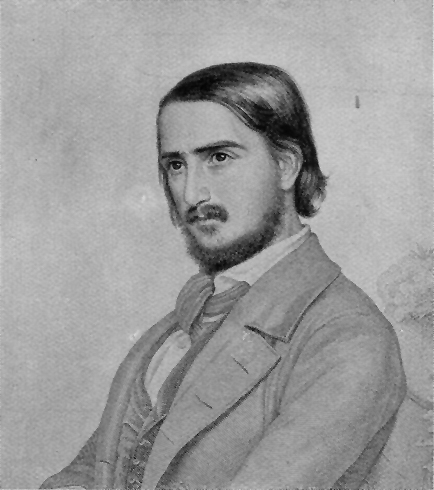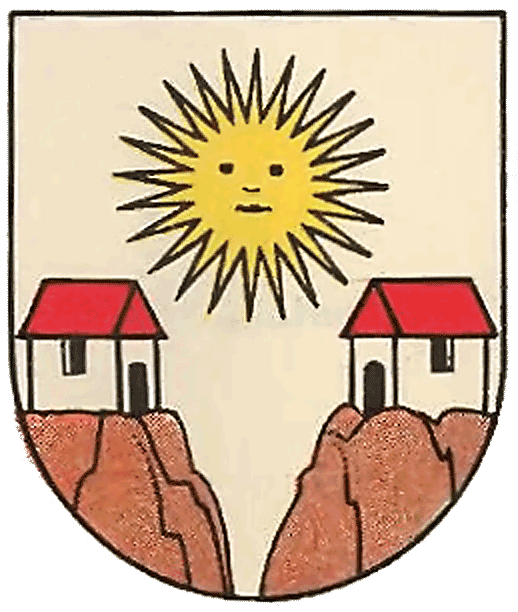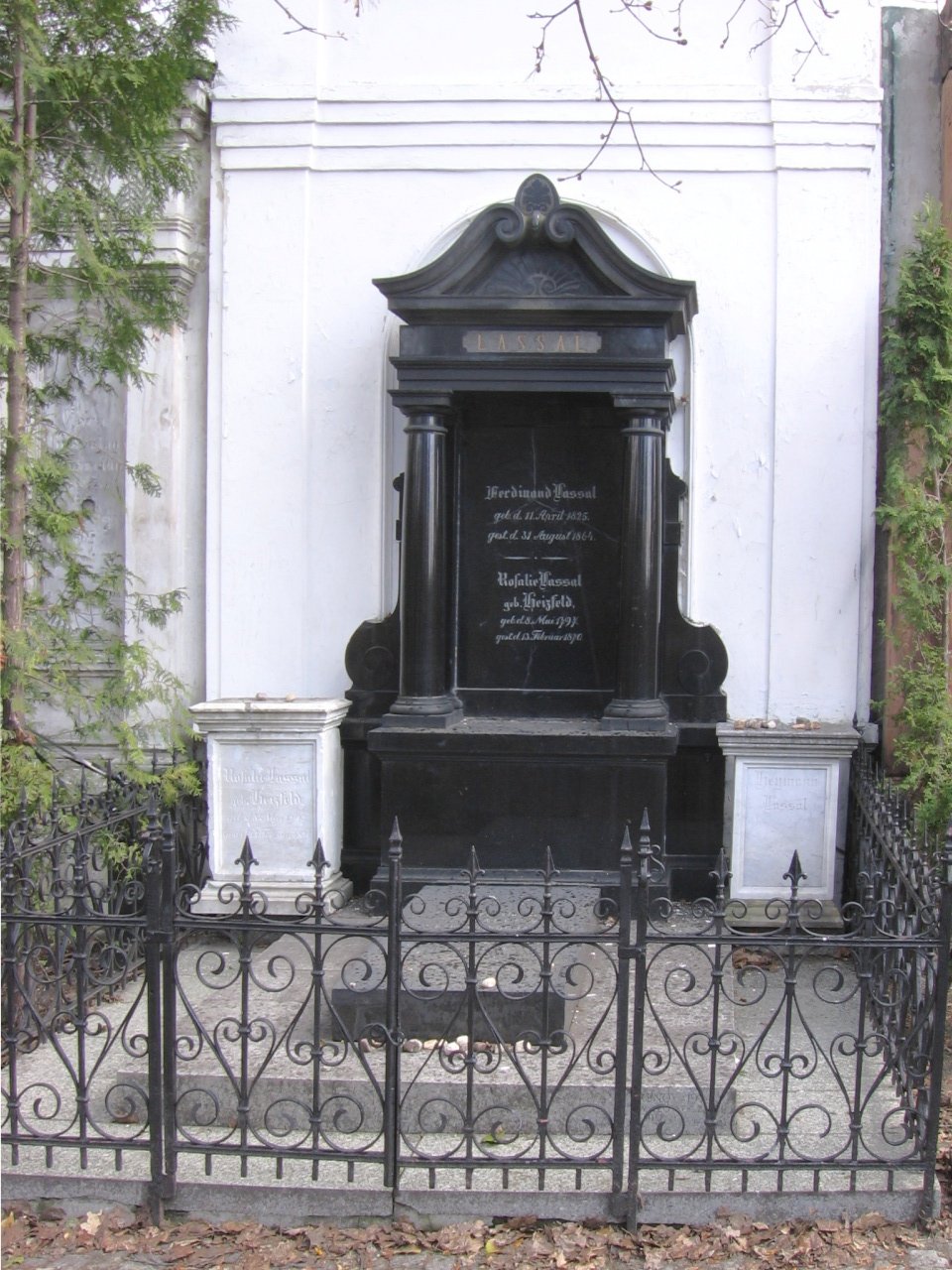|
Herwegh, Georg
Georg Friedrich Rudolph Theodor Herwegh (31 May 1817 – 7 April 1875) was a German poet,Herwegh, Georg, The Columbia Encyclopedia (2008) who is considered part of the Young Germany movement. Biography He was born in Stuttgart on 31 May 1817, the son of an innkeeper. He was educated at the Gymnasium Illustre of Stuttgart, and in 1835 proceeded to the University of Tübingen as a theological student, where, with a view to entering the ministry, he entered the Protestant theological seminary. However, he found the strict discipline distasteful; he broke the rules and was expelled in 1836. He studied law for a short time, but decided to return to Stuttgart, and became editor of August Lewald's periodical ''Europa''. Called out for military service, he had hardly joined his regiment when he became embroiled with a military officer with an act of insubordination, and had to flee to Emmishofen, Switzerland in 1839. His ''Gedichte eines Lebendigen'' ("Poems of a living man") were pu ... [...More Info...] [...Related Items...] OR: [Wikipedia] [Google] [Baidu] |
Lamartine
Alphonse Marie Louis de Prat de Lamartine (; 21 October 179028 February 1869), was a French author, poet, and statesman who was instrumental in the foundation of the Second Republic and the continuation of the Tricolore as the flag of France. Biography Early years Born in Mâcon, Burgundy on 21 October 1790 into a family of the French provincial nobility, Lamartine spent his youth at the family estate. He is famous for his partly autobiographical poem, "Le lac" ("The Lake"), which describes in retrospect the fervent love shared by a couple from the point of view of the bereaved man. Lamartine was masterly in his use of French poetic forms. Raised a devout Catholic, Lamartine became a pantheist, writing ''Jocelyn'' and ''La Chute d'un ange''. He wrote ''Histoire des Girondins'' in 1847 in praise of the Girondists. Lamartine made his entrance into the field of poetry with a masterpiece, ''Les Méditations Poétiques'' (1820) and awoke to find himself famous. One of the not ... [...More Info...] [...Related Items...] OR: [Wikipedia] [Google] [Baidu] |
Johann Wolfgang Von Goethe
Johann Wolfgang von Goethe (28 August 1749 – 22 March 1832) was a German poet, playwright, novelist, scientist, statesman, theatre director, and critic. His works include plays, poetry, literature, and aesthetic criticism, as well as treatises on botany, anatomy, and colour. He is widely regarded as the greatest and most influential writer in the German language, his work having a profound and wide-ranging influence on Western literary, political, and philosophical thought from the late 18th century to the present day.. Goethe took up residence in Weimar in November 1775 following the success of his first novel, '' The Sorrows of Young Werther'' (1774). He was ennobled by the Duke of Saxe-Weimar, Karl August, in 1782. Goethe was an early participant in the '' Sturm und Drang'' literary movement. During his first ten years in Weimar, Goethe became a member of the Duke's privy council (1776–1785), sat on the war and highway commissions, oversaw the reopening of sil ... [...More Info...] [...Related Items...] OR: [Wikipedia] [Google] [Baidu] |
Heinrich Heine
Christian Johann Heinrich Heine (; born Harry Heine; 13 December 1797 – 17 February 1856) was a German poet, writer and literary critic. He is best known outside Germany for his early lyric poetry, which was set to music in the form of '' Lieder'' (art songs) by composers such as Robert Schumann and Franz Schubert. Heine's later verse and prose are distinguished by their satirical wit and irony. He is considered a member of the Young Germany movement. His radical political views led to many of his works being banned by German authorities—which, however, only added to his fame. He spent the last 25 years of his life as an expatriate in Paris. Early life Childhood and youth Heine was born on 13 December 1797, in Düsseldorf, in what was then the Duchy of Berg, into a Jewish family. He was called "Harry" in childhood but became known as "Heinrich" after his conversion to Lutheranism in 1825. Heine's father, Samson Heine (1764–1828), was a textile merchant. His mother Pe ... [...More Info...] [...Related Items...] OR: [Wikipedia] [Google] [Baidu] |
Otto Von Bismarck
Otto, Prince of Bismarck, Count of Bismarck-Schönhausen, Duke of Lauenburg (, ; 1 April 1815 – 30 July 1898), born Otto Eduard Leopold von Bismarck, was a conservative German statesman and diplomat. From his origins in the upper class of Junker landowners, Bismarck rose rapidly in Prussian politics, and from 1862 to 1890 he was the minister president and foreign minister of Prussia. Before his rise to the executive, he was the Prussian ambassador to Russia and France and served in both houses of the Prussian Parliament. He masterminded the unification of Germany in 1871 and served as the first Chancellor of the German Empire until 1890, in which capacity he dominated European affairs. He had served as the chancellor of the North German Confederation from 1867 to 1871, alongside his responsibilities in the Kingdom of Prussia. He cooperated with King Wilhelm I of Prussia to unify the various German states, a partnership that would last for the rest of Wilhelm's life. The ... [...More Info...] [...Related Items...] OR: [Wikipedia] [Google] [Baidu] |
Ferdinand Freiligrath
Ferdinand Freiligrath (17 June 1810 – 18 March 1876) was a German poet, translator and liberal agitator, who is considered part of the Young Germany movement. Life Freiligrath was born in Detmold, Principality of Lippe. His father was a teacher. He left a Detmold gymnasium at 16 to be trained for a commercial career in Soest. There he also familiarized himself with French and English literature, and before he was 20 had published verses in local journals. He worked in Amsterdam from 1831 to 1836 as a banker's clerk. After publishing translations of Victor Hugo's ''Odes'' and ''Chants du crépuscule'', and launching a literary journal, ''Rheinisches Odeon'' (1836–38), in 1837 he started working as a bookkeeper in Barmen, where he remained until 1839. Later on, he started writing poems for the '' Musen-Almanach'' (edited by Adelbert von Chamisso and Gustav Schwab) and the '' Morgenblatt'' (ed. Cotta). His first collection of poems (''Gedichte'') was published in 1838 in Ma ... [...More Info...] [...Related Items...] OR: [Wikipedia] [Google] [Baidu] |
Lichtental
Lichtental is a part of the district of Alsergrund, Vienna. It was an independent municipality until 1850. Notable people * Hans-Adam I, Prince of Liechtenstein (1657–1712) lived here. * Caterina Cavalieri (1755–1801), opera singer, was born here. * Therese Grob (1798–1875), the first love of the composer Franz Schubert, was born here. * Anton von Schmerling (1805–1893), Austrian politician, was born here. * Georg Herwegh (1817–1875), German writer, died here. * Johannes Brahms Johannes Brahms (; 7 May 1833 – 3 April 1897) was a German composer, pianist, and conductor of the mid- Romantic period. Born in Hamburg into a Lutheran family, he spent much of his professional life in Vienna. He is sometimes grouped wit ... (1833–1897) lived here. Alsergrund Katastralgemeinde of Vienna {{Austria-hist-stub ... [...More Info...] [...Related Items...] OR: [Wikipedia] [Google] [Baidu] |
Shakespeare
William Shakespeare ( 26 April 1564 – 23 April 1616) was an English playwright, poet and actor. He is widely regarded as the greatest writer in the English language and the world's pre-eminent dramatist. He is often called England's national poet and the " Bard of Avon" (or simply "the Bard"). His extant works, including collaborations, consist of some 39 plays, 154 sonnets, three long narrative poems, and a few other verses, some of uncertain authorship. His plays have been translated into every major living language and are performed more often than those of any other playwright. He remains arguably the most influential writer in the English language, and his works continue to be studied and reinterpreted. Shakespeare was born and raised in Stratford-upon-Avon, Warwickshire. At the age of 18, he married Anne Hathaway, with whom he had three children: Susanna, and twins Hamnet and Judith. Sometime between 1585 and 1592, he began a successful career in London as an ... [...More Info...] [...Related Items...] OR: [Wikipedia] [Google] [Baidu] |
Ferdinand Lassalle
Ferdinand Lassalle (; 11 April 1825 – 31 August 1864) was a Prussian-German Confederation, German jurist, philosopher, Socialism, socialist and political activist best remembered as the initiator of the social democracy, social democratic movement in Germany. "Lassalle was the first man in Germany, the first in Europe, who succeeded in organising a party of socialist action", or, as Rosa Luxemburg put it: "Lassalle managed to wrestle from history in two years of flaming agitation what needed many decades to come about." As agitator he coined the terms night-watchman state and iron law of wages. Biography Early life Lassalle was born Ferdinand Johann Gottlieb Lassal on 11 April 1825 in Breslau, Province of Silesia, Silesia (now Wrocław, Poland). His father Heyman Lassal was a Jewish silk merchant and intended his son for a business career, sending him to the commercial school at Leipzig. However, Lassalle soon transferred to university, studying first in the University of W ... [...More Info...] [...Related Items...] OR: [Wikipedia] [Google] [Baidu] |
Zürich
, neighboring_municipalities = Adliswil, Dübendorf, Fällanden, Kilchberg, Maur, Oberengstringen, Opfikon, Regensdorf, Rümlang, Schlieren, Stallikon, Uitikon, Urdorf, Wallisellen, Zollikon , twintowns = Kunming, San Francisco Zürich () is the largest city in Switzerland and the capital of the canton of Zürich. It is located in north-central Switzerland, at the northwestern tip of Lake Zürich. As of January 2020, the municipality has 434,335 inhabitants, the urban area 1.315 million (2009), and the Zürich metropolitan area 1.83 million (2011). Zürich is a hub for railways, roads, and air traffic. Both Zurich Airport and Zürich's main railway station are the largest and busiest in the country. Permanently settled for over 2,000 years, Zürich was founded by the Romans, who called it '. However, early settlements have been found dating back more than 6,400 years (although this only indicates human presence in the area and not the presence of a town that early). During ... [...More Info...] [...Related Items...] OR: [Wikipedia] [Google] [Baidu] |


.jpg)



